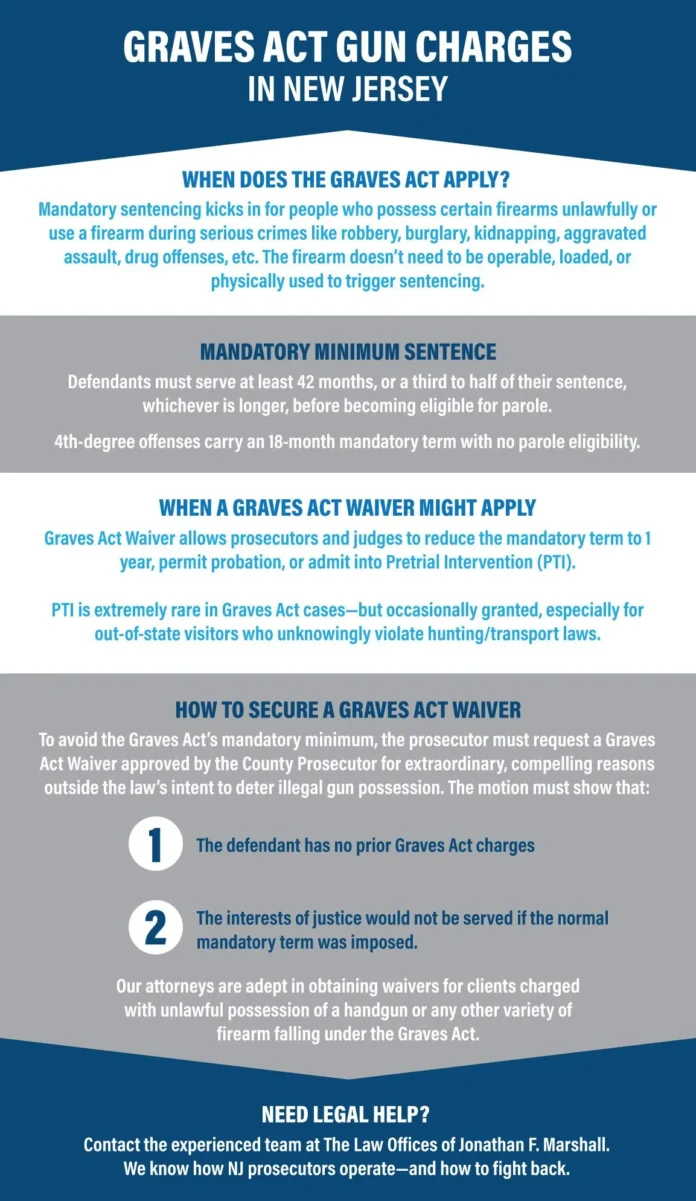NJ Supreme Court Rules on Graves Act Parole Disqualifier, Narrowing Scope for Firearm Offenses in a landmark ruling with significant implications for sentencing in New Jersey, the state Supreme Court has clarified which firearm offenses trigger mandatory parole ineligibility under the Graves Act. The decision, issued on August 5, 2025, in the case of State v. Zaire J. Cromedy, establishes that convictions under certain subsections of the unlawful weapons statute do not automatically carry the Graves Act’s stringent parole restrictions.
NJ Supreme Court case arose from an arrest in August 2021, when Zaire J. Cromedy of New Jersey was taken into custody on an outstanding robbery warrant. During the arrest, authorities recovered a handgun believed to belong to Cromedy. He ultimately pled guilty to first-degree unlawful possession of a weapon under N.J.S.A. 2C:39-5(b)(1) and to a related subsection, N.J.S.A. 2C:39-5(j). The latter applies when a person with a prior conviction subject to the No Early Release Act commits an unlawful possession offense. While first-degree offenses under the Graves Act typically require a mandatory period of parole ineligibility, the question arose whether subsection (j) qualifies for that automatic restriction.
At sentencing, the defense argued that subsection (j) is not explicitly listed in the Graves Act and therefore should not carry a mandatory parole disqualifier. The state countered, suggesting that subsection (j) effectively mirrors subsection (b), which is covered by the Graves Act, and urged the courts to interpret the statutes in tandem. The trial court sided with the state, imposing the Graves Act penalty, a decision later affirmed by the Appellate Division.
The New Jersey Supreme Court, however, disagreed. Writing for a unanimous bench, Justice Michael Noriega emphasized the need to apply the plain language of the statutes as written. The Court concluded that subsection (j) represents a distinct substantive offense that must be treated separately from the underlying firearm convictions cited in subsections (a), (b), (c), or (f). The ruling instructs trial courts to conduct bifurcated proceedings, ensuring that convictions under subsection (j) are evaluated independently rather than automatically triggering Graves Act penalties.
Justice Noriega’s opinion highlighted legislative intent, noting that the Legislature amended the unlawful possession statute and the Graves Act in 2013. While the changes expanded the reach of the Graves Act in certain areas, subsection (j) was never expressly included among the offenses carrying mandatory parole restrictions. The Court concluded that adding subsection (j) to the Graves Act list would have been a legislative decision, not a judicial one, and therefore cannot be inferred by the courts.
Legal experts note that this decision could have broad effects on sentencing for firearm-related offenses in New Jersey, particularly in cases involving prior convictions. By distinguishing between grading statutes and distinct substantive offenses, the ruling may reduce the automatic application of mandatory parole ineligibility in certain situations, potentially affecting both trial strategies and plea negotiations.
For legislators, prosecutors, defense attorneys, and advocates, the ruling serves as a reminder of the careful balance between statutory interpretation and judicial authority. The decision reinforces the principle that courts must adhere to the explicit language of the law while respecting the Legislature’s role in defining criminal penalties.
This development is expected to influence future cases involving the Graves Act and may prompt lawmakers to revisit statutory language to clarify which offenses warrant mandatory parole disqualifiers. New Jersey residents, legal professionals, and those tracking criminal justice reforms will be watching closely as lower courts implement the Supreme Court’s guidance. For more updates on state policies, legislation, and legal rulings affecting New Jersey, visit Explore New Jersey Politics.












